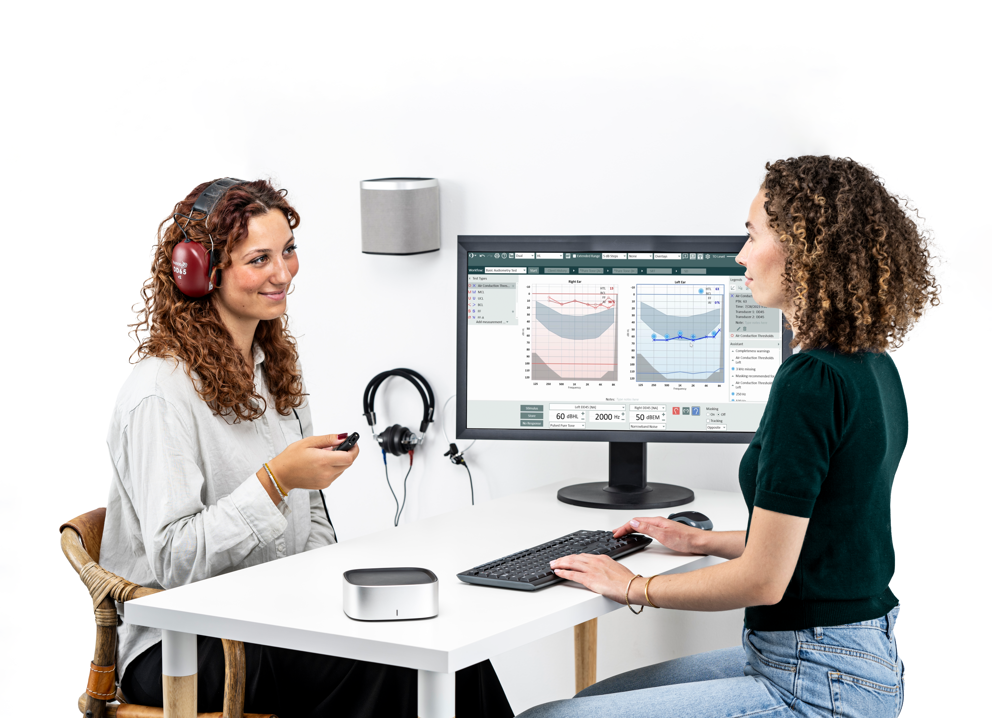
Among adults aged 20-69 who could benefit from wearing hearing aids, only about 16% have ever used them. And most people with hearing loss don't seek treatment for a long time – if at all. If (and when) people with hearing loss do eventually visit a hearing clinic, some of them become discouraged by long wait times for appointments, the cost of hearing aids, poor customer service, or other factors, which may lead them to decide against wearing a hearing aid or returning for follow-up appointments with their hearing care providers.
Research shows that when patients have better healthcare experiences, they also have better health outcomes. There are also significant benefits for providers, including increased patient satisfaction, loyalty, and retention, and higher financial performance for healthcare practices. So, it’s in everyone’s best interest to improve the patient experience in your audiology clinic!
But First, What Do Your Patients Want?

Did you know that 70% of patients would switch healthcare providers for a better experience? That’s a significant percentage!
Keep in mind that enhancing the patient experience means more than just providing consistently high-quality clinical care, which is certainly essential.
Studies consistently find that patients want convenience, to feel heard and understood, clean and comfortable clinical environments, minimal wait times, clear and transparent communication, personalized interactions, and strong relationships with their providers. And if they don’t get those things from one medical practice, they’ll go elsewhere to find clinicians who will meet their needs. Or they might stop seeking hearing care help completely, leaving more people with untreated hearing loss and compounding this ongoing problem in our industry.
7 Tips to Make Your Patients’ Appointments Extraordinary:
1. Offer Easy, Convenient Appointment Scheduling
Patients will sincerely appreciate it if your clinic offered convenient appointments outside of “traditional” working hours, including evenings and weekends, so professionals can see your clinicians outside of the work week. Not only does this provide convenience for younger, professional demographics, but it also helps decrease common stereotypes and perceived stigmas that only “old people” have hearing loss and need to wear hearing aids.
1/3
2. Manage Patient Expectations
Since many patients are anxious about their audiology appointments – especially if it’s their first one – they set expectations and reduce their concerns by clearly communicating what will happen at their upcoming visit. Explain what to expect during the hearing screening, outline the next steps if the audiologist detects hearing loss, and tell them how long the initial appointment should take so they can plan accordingly.
Sharing information in advance helps calibrate expectations and will, hopefully, alleviate any worries leading up to the appointment. It’s also helpful to have resources on your website outlining what to expect at the audiology appointment so your patients have a clear understanding of what’s to come.
3. Encourage Patients to Bring a Loved One to Appointments

Patients may feel overwhelmed during their hearing health appointments and may miss some of the information that their audiologist tells them – especially if they have a hearing loss. Data shows that the presence of a companion can lead to a higher acceptance of hearing aids and other hearing health treatments. For instance, estimates show a 10% to 20% increase in the likelihood of patients pursuing treatment for their hearing loss when a companion attends their appointments. And the conversion-rate can improve as much as 40% if a loved one is involved in the appointment.
The companion can confirm the hearing challenges and encourage the patient to buy hearing aids. Urge your patients to bring their spouse, friend, or other loved one to their appointments to get a more comprehensive picture of the patient’s hearing difficulties and needs.
4. Make the Waiting Area Comfortable and Inviting

Ensure that your waiting room is clean and welcoming. Have plenty of comfortable seating, along with complimentary refreshments – like coffee, tea, and water – for your patients. Have reading materials, like current issues of newspapers and magazines, readily available and play soothing music.
Keep the waiting area neat. Long wait times are patients’ number one complaint, with 40% of patients saying that healthcare wait times are unreasonable, so work diligently to minimize this at your practice. Have a solid scheduling system in place to maximize your clinicians’ precious time. To improve the patient experience, avoid overbooking providers, which contributes to long waits for patients. Even though the wait times should be as short as possible, sometimes patients might come to your clinic early. And sometimes, no matter how exceptional your clinic’s structure is, a little wait time is inevitable. Therefore, it’s important that you have a comfortable and inviting waiting area. The front desk staff could offer to fill out some forms and online surveys for the patients while they wait, to make these tasks easier and more convenient for the patients.
5. Show Compassion and Empathy
While audiologists may see many patients each day, it’s essential for them to treat every patient as if they’re the only – and most important – person they’re treating. Keep in mind that 75% of patients believe their physicians lack empathy – and that’s a concerning statistic! Let’s change that!
Give each patient your full, undivided attention. Adding notes to your PMS is often unavoidable but make eye contact while talking to your patients and don’t just stare at your computer screen. Be mindful that they might be upset to learn that they have hearing loss and that they need to wear hearing aids. Empathize with what they’re experiencing. Be caring and compassionate. Let them feel their feelings, but then reassure them that today’s devices are high-tech, come with innovative features, and provide many game-changing benefits that will make it much easier for them to participate in the things they love to do, like socialize with friends, watch their favorite TV shows, and listen to music.
6. Use Innovative Technology

Technology is revolutionizing audiology and improving the patient experience on every level. On the clinical side, advanced software, like Auditdata Measure, lets audiologists manage and optimize clinical workflows based on data-driven insights to improve patient outcomes and deliver Best Care Experiences to every patient. Additionally, your audiologists can (and should!) spotlight the innovative technologies in the hearing aids that you offer. These aren’t your grandparents’ big, old, clunky devices! Show your patients the sophisticated features and functions that today’s high-tech hearing aids offer, including connectivity to smartphones, rechargeable batteries, features that can be controlled by a smartphone app, and much more!
On the administrative side, Practice Management Software (PMS) is an absolute game changer, optimizing operations for audiology practices. For instance, smarter scheduling lets hearing clinics optimize schedules and minimize wait times for patients. Additionally, hearing clinics can use technology to gather data about consumers to help tailor their healthcare and interactions with their audiology providers to improve patients’ experiences and outcomes.
7. Talk About Their Lifestyle
It’s important to understand each patient’s lifestyle, not only to personalize your interactions with them, but so you can offer the right products to meet their specific needs. While appointment time with each patient is limited, make it a point to ask how personal questions and get to know their lifestyle.
Use your Practice Management Software to keep notes on each patient – their hobbies, families, interests, etc. – so you can remember the details about their lives and refer back to this information during each exam. Your patients will be thrilled – and impressed – that you cared enough to remember about their love of running, their prize-winning tomatoes, and the other details of their lives. That helps make their appointments extraordinary – and keeps them loyal to your practice. It also helps you recommend devices that can withstand their extensive exercise habits, their love of the outdoors, and other hobbies, so you can offer hearing aids with the features and functions they need for their specific lifestyle.
1/3
Auditdata Solutions
Raising Awareness, Improving Lives
As a leading provider of audiology solutions, we see it as our responsibility to raise awareness about the consequences of undetected hearing loss, help guide individuals to take the initial steps toward detection and treatment, and advise hearing care professionals on how to provide the best care experience.

Other Blogs You Might Enjoy:

What Do Your Hearing Aid Users Need?
If someone suspects they have hearing loss, they should see an audiologist for a hearing screening to determine whether they need hearing aids. But then what happens? This blog explains how to give your patients what they need for success with their hearing aids, such as setting proper expectations, providing care and maintenance tips for the devices, offering valuable tips before they buy, and providing ongoing aftercare.

How Auditdata Manage Helps You Deliver Best Care Experiences
Explore how Auditdata's Practice Management Software, Manage, enhances audiology care with advanced scheduling, personalized services, and effective aftercare. Learn to optimize every patient interaction to provide best care experiences to every patient at all times.

Customer vs. Patient – Does it Matter What You Call the People You Serve?
Should hearing clinics refer to the individuals they serve as patients or customers? Do these words matter? Could specific terminology make people feel better (or worse) about needing hearing aids? This blog explores the connotations associated with these terms.
Don't Miss Out On the Latest Insights On Audiology
Sign up today to receive exciting updates, tips, and the latest newsletters from Auditdata.
Resources
⭐️ Auditdata Manage - Practice Management Software
⭐️ Auditdata Measure - Portfolio of Audiological Equipment
⭐️ Why People Don't Wear Their Hearings Aids - Responding to Common Hearing Aid Objections
⭐️ Glenn’s Hearing Journey: “The Improvement Has Been Dramatic”
⭐️ How Audiology Technology is Shaping Trends in Hearing Health
⭐️ Are Hearing Aids Finally Getting a Hipper Reputation?
⭐️ What Do Your Hearing Aid Users Need?
⭐️ How to Successfully Follow Up with Patients Through Recall Programs
⭐️ 5 Principles to Improve the Patient Experience
⭐️ 18 Easy Ways to Improve the Patient Experience
⭐️ Should a Patient Visit Include Their Companion? Yes — Here’s Why.
⭐️ New Webinar: The Art of Increasing Conversion Rates with Incoming Calls
⭐️ It’s Time to Elevate the Patient Experience in Healthcare

